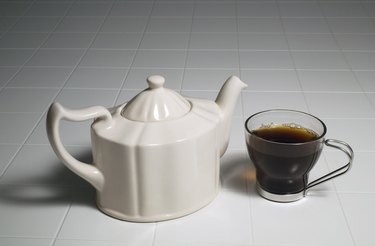
Gout is a form of arthritis resulting from excessive buildup of uric acid in your body. The salt, called irate, from excess uric acid causes crystals to form in your joints, leading to pain and inflammation. An affected joint usually becomes shiny, swollen and stiff, and it can be red or purple in color. Gout is related to high triglycerides, excess alcohol consumption and consumption of purine-rich foods like meat and shellfish. You should seek medical treatment for gout, but also watch your diet and avoid certain foods and drinks. According to the University of Maryland Medical Center, black tea is one thing you should avoid or at least reduce your consumption of if you have gout.
Black Tea Contains Oxalate
Video of the Day
A study published in "Urological Research" in 2009 looked at gout patients who had calcium oxalate urinary stones and gout patients who did not. They determined there's a likely relationship between gout and calcium oxalate stones due to the change in uric acid metabolism in gout patients. The University of Maryland Medical Center recommends cutting back on foods that contain oxalate, including black tea. According to a study published in the "Asia Pacific Journal of Clinical Nutrition" in 2002, the amount of oxalate present in it is small compared to amounts in many foods in a typical diet. However, if you add milk to your black tea, the oxalate in the tea can bind to the calcium in the milk, increasing your risk of calcium oxalate stone formation.
Video of the Day
Black Tea Contains Purine
A study published in the "Journal of Agricultural and Food Chemistry" in 2004 identified alkaloids called purines in black tea. Purines have been associated with an increased risk of gout, according to a study published in the "The New England Journal of Medicine" in 2004. Over 12 years, scientists monitored the diet of 47,150 participants and surveyed their risk of gout every four years. By the end of the study, they found that meat and seafood put the participants at the highest risk for gout. Meat and some vegetables are high in purines, but the study found that moderate consumption of vegetables with purines did not increase gout risk. To reduce your risk of gout or gout attacks, the University of Maryland Medical Center advises limiting your intake of foods that contain purine.
Teas That Help Fight Gout
Some beneficial teas could potentially improve your symptoms. Decaffeinated green tea is recommended for its antioxidant content. Brew devil's claw to help reduce inflammation and pain if you have gout. Simply place 1 teaspoon of the herb in a metal strainer, put the strainer in boiling hot water and steep for five to 10 minutes. Do not drink in conjunction with blood-thinning medications. Other herbal teas that may help gout include turmeric and bromelain.
Other Considerations
If you have gout, it may help to see a nutritionist or health coach to help you assess and refine your diet to improve symptoms. If you drink tea, avoid adding sugar to it. Sugary foods and drinks are associated with increased risk of gout. Staying well-hydrated will help flush out excess uric acid and improve conditions. Drink 6 to 8 glasses or more of water each day to avoid dehydration, which can cause an attack of gout. Get a blood test for any nutritional deficiencies, and take supplements if needed. Having enough omega-3 fatty acids in your diet helps keep inflammation down.
- University of Maryland Medical Center: Gout
- The Free Dictionary: Uric Acid
- Asia Pacific Journal of Clinical Nutrition: Oxalate Content and Calcium Binding Capacity of Tea and Herbal Teas
- Journal of Agricultural and Food Chemistry: HPLC-MSn Analysis of Phenolic Compounds and Purine Alkaloids in Green and Black Tea
- Urological Research: Calcium Oxalate Stone and Gout
- The New England Journal of Medicine: Purine-Rich Foods, Dairy and Protein Intake, and the Risk of Gout in Men
Is this an emergency? If you are experiencing serious medical symptoms, please see the National Library of Medicine’s list of signs you need emergency medical attention or call 911.